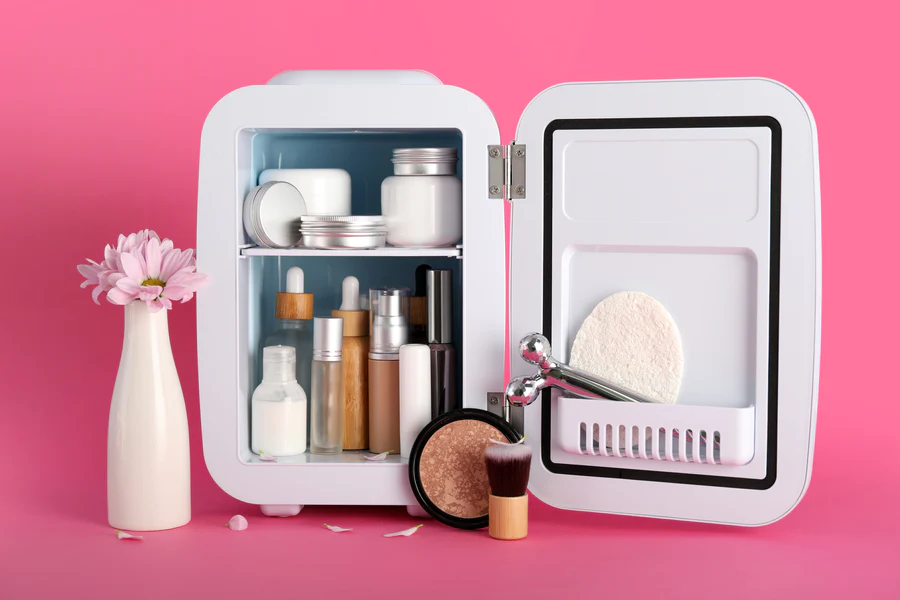The lifetime and effectiveness of your skincare products may be impacted by how you store them. The components may separate or degrade more quickly in the presence of heat or high temperatures, which would render them ineffective. For this primary reason, product manufacturers advise storing their items in a dry, cool environment.
What are the benefits of storing products in the fridge?
- In addition to giving your skin a cooling sensation, keeping goods in the refrigerator also:
- Provides a steady temperature that may aid in the active components’ continued efficacy (delay their breakdown).
- Helps prevent bacteria from growing, lowering the chance that your skincare products will become contaminated. Enables products to function better at de-plumping or relaxing the skin.
- Extends the product’s shelf life and maximizes its benefits.
Which products should be kept in the fridge?
If you want to keep your products cold, you might want to use a skincare small fridge to keep everything organized and easily accessible. Naturally, you have the option to keep them in your primary refrigerator. Some skincare products that benefit from cold storage are listed below.
Eye creams
These are some of the greatest items to maintain a steady, low temperature. Due to short-term vasoconstriction, a cold eye cream or serum provides an extra de-puffing action that helps enhance the appearance of dark circles and bags under the eyes (tightening or blood vessels). Additionally, the cooling effect gives a pleasant sensation that helps to revive fatigued eyes.
Serums
These goods will remain stable for a long time if they are kept chilled because they contain active components. For example, vitamin C is known to be extremely light-sensitive and to degrade (via a process known as oxidation) when kept in a warm or bright environment. They are therefore enclosed in airtight, opaque containers.
Acne treatments
Keeping skincare products that contain benzoyl peroxide and salicylic acid cold will prolong their effectiveness. This also applies to acne medications that are prescribed or contain antibiotics. Additionally, the product’s container may advise against storing it above a specific temperature.
Sheet masks and eye patches
The revitalizing benefits of your sheet masks and eye patches can be increased by keeping these items refrigerated. This is particularly true for those with anti-inflammatory, cooling, and soothing claims. Gel-based masks that are chilled and soothing are a great way to soothe inflamed skin and provide a cool splash of hydration.
Sunscreens
To get the most out of your SPF products, store them in the refrigerator. Many of the active chemicals in the products can be swiftly broken down by heated storage or room temperature, making them less effective at blocking UV radiation. The items may deteriorate more quickly if they are exposed to heat and light.
Moisturizers
The uniformity of the product may determine this. The best place to store facial moisturizers with thicker consistency is somewhere cool and dry, as storing them in the refrigerator can change their texture. For an added cooling effect, you can safely store a gel-based moisturizer in the refrigerator.
Skincare tools
Keeping your face globes, gua sha stones, jade roller, and other skin care supplies in the refrigerator is also a smart idea. Chilled instruments, in addition to providing a cooling feeling, can aid in depuffing, increasing blood flow, and revitalizing the skin. In order to prevent bacteria from growing on these instruments and getting onto your face skin, be sure to keep them clean.
Which products don’t need refrigeration?
Clay masks and cosmetics containing oil (such foundations or oils for the face) shouldn’t be kept in the refrigerator. They may become unstable or harden as a result of doing this. They may also become useless due to changes in their consistency and color. They can be kept at room temperature and out of direct sunshine or heat.
Be aware that storing your skincare and cosmetics in the bathroom is not the best choice. This room’s humidity and frequent temperature variations can make it more likely for mold and germs to thrive. Additionally, they could heat up your skincare products and ruin the formula.
DIY Face Masks and Natural Oils:
This is a bit tough because the answer will vary based on what ingredients are in the masks and creams. You should definitely refrigerate masks and creams made from food or preservatives (such avocados) as soon as you open or use them, just like you would any other food item. It is advised that they be chilled between 45° and 60°F. There’s no particular need to refrigerate masks and creams that don’t include food or preservatives. Refrigerating cosmetic creams can enhance their effectiveness or prolong their shelf life, similar to other creams for cosmetic purposes.
Conclusion:
There are many advantages to refrigerating some skincare products, including increased effectiveness and longer shelf life. This article has covered the different skincare products that do well in colder weather, such as face masks, mists, and serums and eye creams. You may extend the freshness and potency of these items and feel refreshed after using them by keeping them in the refrigerator. Why not attempt it then? Enjoy the reviving effects of frozen skincare products by including this easy yet powerful practice into your skincare regimen. It’s never been simpler to keep it fresh—your skin will appreciate it!

